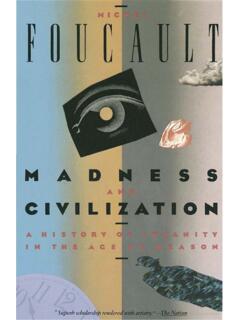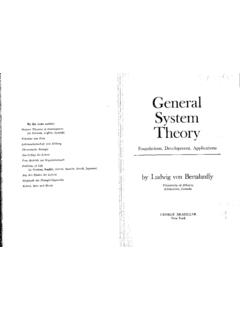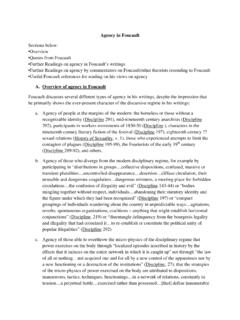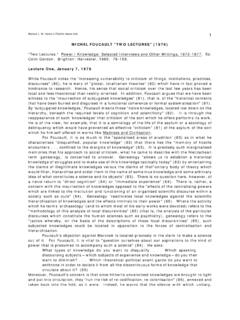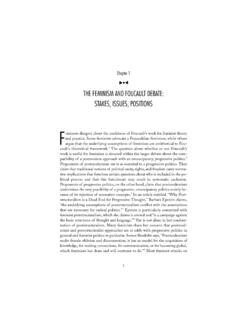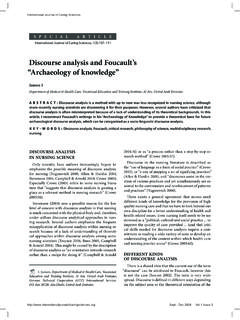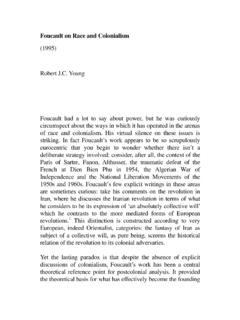Transcription of Michel Foucault - Monoskop
1 Michel Foucault FEARLESS SPEECH Edited by Josepb Pearson SEMIOTEXT(E) Special thanks to Johanna Balusikova fur design and to Sylvere Lotringer and Ben Meyers. for editing: and copy~editing Gerard Aime and DanielJe Bancilhon for the Foucault photos on the front cover and inside back cover, respectively. This work received support from the French Ministry of Foreign Affairs and the Cultural Services of the French Embassy in the United States. ScmioteXt(e) 2571 W. 5,' SlIeet L"" Angeles, Ca, 90057 USA e-mail: 2001 Semiotext(e) All rights reserved. Printed in the United States of America 10 9 8 7 6 5 4 CONTENTS EDITOR'S PREFACE 1. The Word ParThesia THE MEANING OF THE WORD Frankness Truth Danger Criticism Duty THE EVOLUT'ON OF THE WORD Rhetoric Politics Philosophy 2. Parrhesia in Euripides THE PHOENICIAN WOMEN HIPPOLYTII$ THEBACCHAE ELECTIIA ION Hermes' Prologue Apollo's Silence lon's Role Creusa's Role ORESTES 'NG PARRHESIA 3.
2 Parrhesia in the Crisis of Democratic Institutions 7 9 11 12 13 15 17 19 20 20 22 23 25 26 30 31 33 36 36 40 44 52 57 71 75 4. in the Care of the Self SocRATIC PARRHESIA THE PRACTICE OF PARRHESIA In Human Relationships Community life Public life Personal relationships In Techniques of Examination Preliminary remarks Solitary self-<!!xaminatlon Self-diagnosis Self-testing Concluding Remarks Bibliography 89 91 107 107 108 115 133 142 142 145 150 160 167 175 "My intention was not to deal with the problem of truth, but with the problem of the truth-teller, or of truth-telling as an activity: .. who is able to tell the truth, about what, with what consequences, and with what relations to power .. [W]ith the question of the importance of telling the truth, knowing who is able to tell the truth, and knowing why we should tell the truth, we have the roots of what we could call the ;critical' tradition in the West.
3 " Michel Foucault 7 EDITOR'S PREFACE The following text was compiled from tape-recordings made of six lectures delivered, in English, by Michel Foucault at the University of California at Berkeley in the Fall Term of 1983. The lectures were given as part of Foucault 's seminar, entitled "Discourse and Truth," devoted to the study of the Greek notion of parrhesia or "frankness in speaking the truth." Since Foucault did not write, correct, or edit any part of the text which follows, it lacks his imprimatur and does not reflect his own lecture notes. What is given here constitutes only the notes of one of his auditors. Althongh the present text is primarily a verbatim transcription of the lectures, repetitive sentences and phrases have been eliminated, responses to questions have been incorporated, whenever possible, into the lectures themselves, more accessible translations of certain Greek texts have been substituted, and numerous sentences have been revised, all in the hopcof producing a more read-able set of notes.
4 The division of the lectures into sections, the section headings, all footnotes, and a bibliogmphy giving ref-erences to footnoted material, also have been added. The editor gmtefolly acknowledges his indebtedness to John Carvalho for providing information which enabled him to audit Foucault 's course. He also expresses his g .. titude to Dougal Blyth for advice on various matters pertaining to the classical Greek texts Foucault discusses. In addition, he thanks Jacquelyn Taylor for her help in IOCliting some of Foucault 's references. Joseph Pearson Department of Philosophy. Nonhwestem UniversitY 1. The Word Parrhesial FEARLESS SPEECH 11 THE MEANING OF THE WORD' The word parrhesia [1tappl)aia] appears for the first time in Greek literature in Euripides [ ], and occurs throughout the ancient Greek world oOetters from the end of the Fifth Century But it can also still be found in the pattistic texts written at the end of the Fourth and during the Fifth Century of times, for instance, in lean Chrysostome [ 345-407].
5 There are three forms of the word: the nominal form par-rhesia; the verb form parrhesiazomai [ 1tappllcrtci~ ] (or bet-ter' parrhesiazesthai [1tapP1l<Jtci~et;em]); and there is also the word parrhesiastes [1tapPllcrtamrl<;], which is not very frequent and cannot be found in the Classical texts. Rather, you find it only in the Greco-Roman period-in Plutarch and Lucian, for example. In a dialogue of Lucian, "The Dead Come to Life, or The Fisherman, , one of the characters also has the name Parrhcsiades [nappl)crta l. Parrhesia is ordinarily translated into English by "free speech" (in French by franc-parler, and in German by Freimuthigkeit). Parrhesiazomai or parrhesiazesthai is to use par-rhesia, and the parrhesiastes is the one who uses parrhesia, , the one who speaks the truth. In the first part of today's seminar, I would like to give 1. First Leeture: 10 October 1983. 2. Cf.]
6 H. Liddell & R. Scott, "TIapp1\aiu" in A GreeJ<.-English Lexicon, 1344; Pierre Miquel, "TIapp1lola" In Dictionnaire de Spirilualitc) Vol. 12. cot 260--261; and Hejnrich Schlier, "TIapPTtcriu. na:pPTlcru:i~O!1 t" in 'I1ux;lcgicai Dictitmaty of the New Testament, Vol. 5, 871-886. 3. Lucian) "The Dead Come to Life, or The Fisherman, Trans, A, M. Harmon in The WOrks of Lucian. Vol. 3, 1-81. 12 Mlchel fovcat.;/t a general apen;u about the meaning of the word parrhesia, and the evolution of this meaning through Greek and Roman culture. Frankness To begin with, what is the geoeral meaning of the word par-rheria! Etymologically, parrhesiazesthai means "to say every-thing" -from pan [nav] (everything) and rhema [ ] (that which is said). The one who uses parrhesia, the parrhesiastes, is .someone who says everything he4 has in mind: he does not hide anything, but opens his hean and mind completely to other people through his discourse.
7 In parrhesia, the speaker is supposed to give a complete and exact account of what he has in mind so that the audience is able to comprehend exactly what the speaker thinks. The word pameria, then, refers to type of relationship between the speaker and what he says. For inparrheria, the speaker makes it manifestly clear and obvious that what he says is his own opinion. And he does this by avoiding any kind"f rhetoricalform which would veil what he thinks. Instead, the parrhesiastes uses the most direct words and forms of expression he can find. Whereas rhetoric pro-vides the speaker with technical devices to help him prevail upon the minds of his audience (regardless of the rhetorician's own opinion concerning what he says), in parrhesia, the par-rheriastes acts on other people's minds by showing them as directly as possible what he actually believes. If we distinguish betwcen the speaking subject (the subject of enunciation) and the grammarical subject of the enounced, 4.
8 Responding to a student's question~ Foucault indicated that the oppressed role of women in Greek society generally deprived them of the use of parrhesia (along with aliens, slaves, and children). Hence the pre~ dominant use of the masCUline pronoun throughout, FeARLESS $PI!HiCH 13 we could say that there is also the subject of the enuncian-dum-which refers to the held belief or opinion of the speak-er. Inparrheria the speaker emphasizes the fact that he is both the subject of the enunciation and the subject of the enun-ciandum-that he himself is the subject of the opinion to which he refers. The specific "speech activity" of the parrhesi-astic enunciation thus takes the form: "I am the one who thinks this and that." I use the phrase "speech activity" rather than John Searle's "speech act" (or Austin's "performarive urterance") in order to distinguish the parrhesiastic utterance and its commitments from the usual sorts of commitment which obtain between someone and what he or she says.
9 For, as we shall see, the commitment involved inparrhesia is linked to a certain social situation, to a difference of statuS between the speaker and his audience, to the fact that the parritesiastcs says something which is dangerous to himself and thus involves a risk, and so on. Truth There are twO types of pamesia which we must distinguish. First, there is a pejorative seose of the word not very far from "chattering/' and which consists in saying any~ or everything one has in mind without qualification. This pejorative sense occurS in Plato,5 for example, as a characterization of the bad democratic constitution where everyone has the right to address his fellow citizens and to tell them anything-even the most stupid Or dangerous things for the city. This pejora-tive meaning is also found more frequeody in Christian liter-ature where such o(bad" parrhesia is opposed to silence as a 5.)
10 Plato, Republic 577b. cr. also Phaedtu, 240e & Laws 649b, 671b. 14 Michel Foucault discipline or as the requisite condition fur the contemplation of God.' As a verbal activity which reflects every movement of the heart and miod, P""Msia in this negative sense is obvious-lyan obstacle to the contemplation of God. Most of the time, however, pmrhesUz does not have tbis pejorative meaning in the classical texts, but rather a positive one. Parrheriazesthai means "to tell the truth." But does the parrMsUistes say what he thinks is rrue, or does he say what is really rrue? To my mind, the parrhesiastes says what is true because he k1W'lJ)' that it js rrue; and he knuws that it is rrue because it is really rrue. The pmrMsUistes is not only sincere and says what is hls opinion, but his opinion is also the truth. He says what he knows to be true. The second characteristic of parrhesia, then, is that there is always an exact coiocidence between belief and truth.
